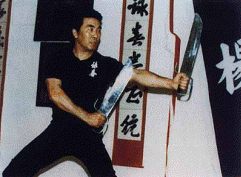Free Lessons for Active Duty Military Personnel and ROTC Cadets

Master Robert Yeung was born in Kowloon in 1938. His first martial arts experience began when he was 16 years old: The teenaged Yeung joined a Japanese Judo school in Kowloon. Yeung found grappling to his liking and stayed with the school for four years, rising to the rank of senior brown belt. Master Yeung recalled that there were not many Kung Fu schools around. The Chinese Kung Fu schools that he visited lacked the discipline and the regimental training found in traditional Japanese Judo training. “I recommend Judo training for teenagers before they learn kung fu.”
Master Yeung joined the police auxiliary at the age of 21. He also attended drafting school while working part-time. Master Yeung’s childhood friend, Shak Chun Wah, stopped by one day to pass on the word about a system of Kung Fu named Wing Chun. The Wing Chun system was practical and useful in street situations typically found in Hong Kong. As both young men shared their knowledge, Robert Yeung got his first experience with Wing Chun. Shak moved swiftly inside Yeung’s arms, delivered several punches, shifted his stance, and trapped one arm over the other arm with a downward pressing palm maneuver. The two friends talked at length about the unique arm trapping and leg jamming techniques within the Wing Chun system. Shortly after this meeting, Shak took Yeung to see Master Wong Long. At the age of 24, Robert Yeung began training in Wing Chun Kung Fu under Si-Gung Wong Long.
Learning quickly, Robert Yeung became Wong Long’s close assistant and sparring partner. Robert Yeung rigorously trained with Wong Long for just over four years. To expand his Wing Chun horizon of knowledge, Robert Yeung sought instruction from Wong Chok. During the next two years, Wong Chok imparted to Robert Yeung the two coveted Wing Chun weapons. Wong Chok also expanded Yeung’s knowledge of using Wing Chun’s tactical footwork traps and jams to uproot and gain advantage over an opponent. Yeung established himself as a skilled and aggressive fighter. His unyielding and forward charging ability earned him the Wing Chun name Yeung Biu. (“Biu” is a special Chinese name for Tiger.)
Master Wong Chok took Robert Yeung to meet the now aged Yip Man. With Wong Chok’s introduction and recommendation, Yip Man gave his approval for Robert Yeung to open his own school and teach students. Robert Yeung stayed in Hong Kong for another two years before meeting his wife and moving to Hawaii, U.S.A. in 1971. He recalled the many hardships that he had to endure in a new country as an immigrant. Despite the rough transition, Yeung officially opened his first Wing Chun school in Hawaii in 1973. As his following grew, Yeung’s school moved from Rex Ravell’s gym in Honolulu to the Armed Forces YMCA. The Armed Forces YMCA became the home of Wing Chun in Hawaii for the next 12 years, from 1974 to 1986 when the building was sold. Master Yeung’s school relocated to the Chinese Cultural Plaza, Chinatown, in 1987. Today, Master Yeung’s Wing Chun Kung Fu school is still open. His Wing Chun school in Hawaii is one of the oldest traditional schools operating outside of Hong Kong.
Master Yeung has retired from work to spend more time at his Chinatown Wing Chun school in Honolulu. His two children (a girl and a boy) are now grown. Master Yeung enjoys teaching and plans to travel more during his retirement from work. He states that there are many promising young students in his school today. “If they can diligently pursue their Wing Chun training, they will become our next generation of Wing Chun teachers.”
During the past 24 years of Master Yeung’s teaching in Hawaii, hundreds of Wing Chun practitioners have come through his program. Dozens of Master Yeung’s students have finished the Mook Jong (Wooden Man) techniques. Of the many graduates of Master Yeung, eleven have established their own schools while many others are teaching small groups around the United States and internationally. Although Master Yeung never mentioned his success, it can be said that he was one of the most successful Wing Chun teachers in the United States. This website is dedicated to Master Yeung, his many graduates, and his numerous followers. Master Yeung passed away Sepetember 3, 2009. He is very much missed.